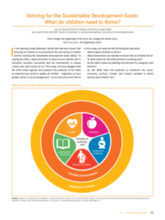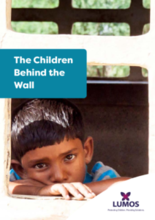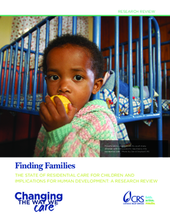Displaying 321 - 330 of 771
This essay critically engages with the 2030 Global Agenda and assesses the potential of the SDGs to transform our world to enable all children – regardless of race, gender, ability, or social background – to not only survive but thrive.
The objective of this essay is to determine how substitute child care in the Czech Republic has changed in the last ten years.
In this video from Time for Global Action: Advancing the Sustainable Development Goals, Stephen Ucembe shares his experience of living in an orphanage and how institutionalization was detrimental to his development and wellbeing.
This research was conducted to study the relationships between academic performance, learning motivation, institutionalised environments and guardian involvement of children reared in a Malaysian orphanage.
This study examined facial emotion recognition in 12-year-olds in a longitudinally followed sample of children with and without exposure to early life psychosocial deprivation (institutional care).
Seventy-eight postinstitutionalized (PI) children adopted at ages 17–36 months were assessed 2, 8, 16, and 24 months postadoption on measures of cortisol and parenting quality, and compared to same-aged children adopted from foster care (FC, n = 45) and nonadopted children (NA, n = 45).
This publication from Lumos describes the institutionalization of children the world over and its impacts, calling for an end to institutions and highlighting some of the particular groups of children who are most deprived of liberty.
This study examined the status of the State Program on Deinstitutionalization and Alternative Care (SPDAC), a public policy aimed at transforming 55 institutions covering 14,500 children during 2006–2016 in Azerbaijan.
Guided by an ideation-to-action theoretical framework for suicide prevention, the goal of the proposed research study is to describe and identify risk and protective factor correlates of youth suicidal behaviour among those at highest risk for suicide – orphans who reside in a low- and middle-income country (LMIC) institutional setting.
This review is a summary of the literature, from multiple disciplines, on residential child care and its deleterious effects on children.




